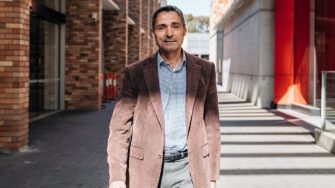UNSW Professor Sami Kara named Fellow by the German National Academy of Science and Engineering
Professor Kara was elected as Fellow for his innovative work in the field of sustainable manufacturing and life cycle engineering.
Professor Kara was elected as Fellow for his innovative work in the field of sustainable manufacturing and life cycle engineering.

Professor Sami Kara, a leading researcher in the field of sustainable manufacturing and life cycle engineering, has been elected as Fellow by acatech, the German National Academy of Science and Engineering.
Fellows of acatech are elected based on their outstanding scientific achievements and reputation. Prof. Kara has been recognised for his contribution to research in sustainable manufacturing and his international leadership in the field, and is the first Australian academic to join the academy.
In the 1990s, Prof. Kara pioneered research into the circular economy in Australia. His research was part of the first project in Australia to investigate the economic and environmental viability of implementing circular economy strategies, such as reducing, reusing, remanufacturing and recycling, in the household appliance industry.
Since joining UNSW in 2000, his research has involved developing technology solutions with a life cycle view by using circular economy strategies to decarbonise and reduce environmental impact of manufacturing industry, while helping them create value. Prof. Kara’s research is crucial towards meeting the United Nations’ target of limiting global warming to 1.50 C by 2050.
Regarding his election as Fellow of acatech, Prof. Kara said: “I look forward to providing thought leadership and building a strategic relation between Australia and Germany. Australia can benefit immensely from the scientific and technological strength of Germany.”
acatech is a working academy and counts just over 600 scientists. It advices policymakers and the public on strategic engineering and technology policy issues. Its members are prominent scientists from the fields of engineering, natural sciences, medicine, humanities and social sciences. Through cross-border thinking and international cooperation, acatech aims to tackle global challenges and answer questions of the future.
Prof. Kara is not new to collaborations with Germany. He is also co-director the joint German-Australian Research Group on Sustainable Manufacturing and Life Cycle Engineering, which aims to make manufacturing processes and resources consumption more sustainable through international cooperation.
He has authored more than 300 peer reviewed scientific publications and is an elected fellow of the UNSW Scientia Education Academy, the Royal society of New South Wales (RSN), the International Academy of Engineering and Technology (AET) and the International Academy of Production Engineering (CIRP).